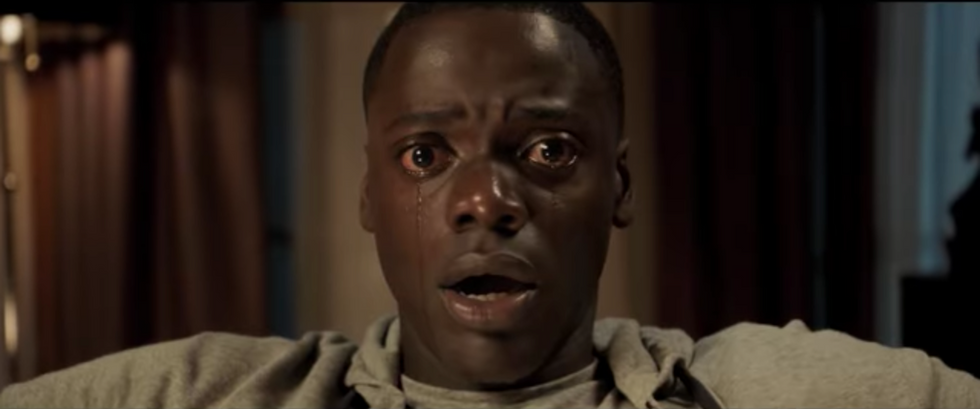When the trailer for “Get Out” was first released people were confused. A horror film, created by comedian Jordan Peele that is about a black man going to meet his white girlfriend’s parents.
On paper, it shouldn’t have worked, but it did. Peele created the year’s most an insightful and timely film. A year that saw larger visibility for white supremacy, racial tension and larger conversations about cultural appropriation.
To be a film that somehow addresses all of the current issues in American culture in a way that is not preachy and is entertaining is no small feet, yet Peele did this effortlessly. If the Oscars truly do care about great filmmaking and story, “Get Out” must be nominated.
“Get Out” is about Chris and his girlfriend Rose. Chris is going to meet Rose’s family for the first time. The only problem is Chris is black and Rose is white, which leads to Chris worrying about meeting her parents.
When they first arrive Rose’s parents, Missy and Dean Armitage, are overly accommodating. Talking about how they would have voted for Obama three times, speaking in slang or constantly reassuring Chris that they are not racist. This behavior is awkward, but not out of the ordinary.
As the weekend progresses though, Chris finds himself in stranger situations. At one point the family has a big party, during such party Chris is fielding racist questions and comments from the party goers. The audience soon finds out that this party was, in fact, an auction. This auction was for Chris’s body.
Rose and her family have been capturing people of color to sell their bodies to their friends, sending the souls inside this body to a place called the sunken place. This movie is twisted, well written and beautifully crafted, yet aside from that, it speaks to our society more than any other film that has come out in a long time.
The Oscars has had its fair share of controversy over the past few years. In 2015, the hashtag Oscars so white started trending. This hashtag propelled the conversation about the glaring diversity issue in Hollywood.
The hashtag did not yield the results it wanted, because yet again people of color did not get nominated for any major Oscars in 2016. Yet, Hollywood and the Oscars wants to tout itself as the moral compass of society.
With mediocre movies like “Crash,” winning best picture preaching its message against prejudice or its overtly political tone, the Oscars preaches but does not practice. A person of Color has never won best director, best screenplay, best cinematographer and only two people of color have won best picture. That is not to say that people of color should win these awards to fill a quota, it is just pointing out the inconsistencies of Hollywood when it comes to social justice.
Inconsistencies that “Get Out” addresses, this white liberal need to be “woke.” The joke of “I would have voted for Obama three times” is told over and over, making a clear point that white liberalism is about how things look without true, enacting change. White liberals want to look as though there is care, but deep down it is serving the racist purpose of keeping power.
Politically speaking, we are living in the sunken place of color commodifying hell. Thursday, four days before Martin Luther King Jr Day, President Donald J. Trump was talking about the Dream Act. The Dream Act protects immigrants from various countries who came over to America as minors.
When discussing this act, President Trump described countries made up predominantly of people of color as “shithole” countries.
Four days after that shitstorm, Trump tweeted out a video talking about MLK and how he dreams to bring people of all races together. Thus using a black body to cover his political tracks, much like what the Armitage’s do when it comes to their housekeeper and gardener. They keep these black bodies in their home, it turns out to be grandma and grandpa, to hide their racist intentions from their guests.
This film, frankly, is the most important film of 2017. It brought to light racist, political issues in a way that is readily available for audiences to engage in. The cultural conversation this film has opened is an important one that fancy film people should not turn their nose up at.
Sometimes, it is more than just the craft of filmmaking. Sometimes, it is about how a film brings to light issues within society that has not been pinpointed quite yet. “Get Out” not only transcends the screen it is incredibly written, directed, shot and acted. It is a horror film, yes, but it is scary because it is true to society.
The monsters are not men in masks, but men in power. Men in power at the Oscars need to ask themselves: will we recognize an incredible film that is truly important? Or will we continue to pretend like we know what is important without acting on it? For the sake of film and filmmaking, I hope they choose the former.



 Photo by
Photo by  Photo by
Photo by  Photo by
Photo by 



















